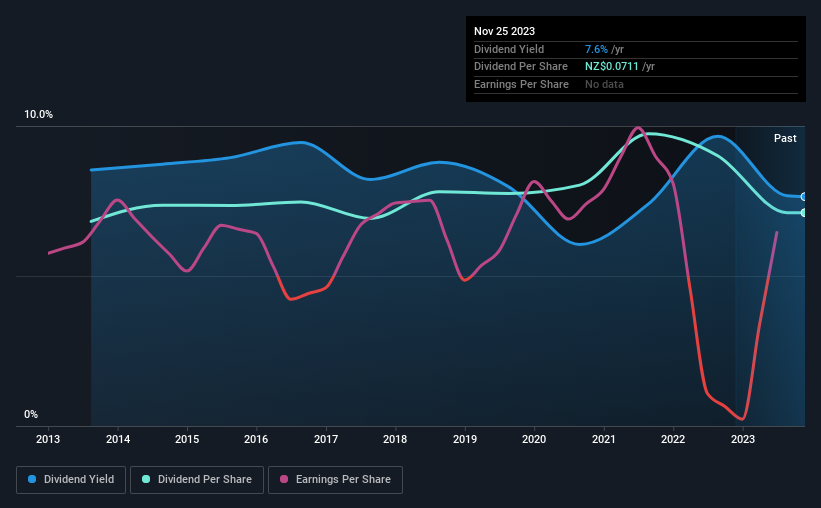Don't Buy Marlin Global Limited (NZSE:MLN) For Its Next Dividend Without Doing These Checks
It looks like Marlin Global Limited (NZSE:MLN) is about to go ex-dividend in the next four days. The ex-dividend date occurs one day before the record date which is the day on which shareholders need to be on the company's books in order to receive a dividend. The ex-dividend date is important because any transaction on a stock needs to have been settled before the record date in order to be eligible for a dividend. This means that investors who purchase Marlin Global's shares on or after the 30th of November will not receive the dividend, which will be paid on the 15th of December.
The company's next dividend payment will be NZ$0.018 per share. Last year, in total, the company distributed NZ$0.071 to shareholders. Based on the last year's worth of payments, Marlin Global has a trailing yield of 7.6% on the current stock price of NZ$0.93. We love seeing companies pay a dividend, but it's also important to be sure that laying the golden eggs isn't going to kill our golden goose! So we need to investigate whether Marlin Global can afford its dividend, and if the dividend could grow.
See our latest analysis for Marlin Global
Dividends are typically paid out of company income, so if a company pays out more than it earned, its dividend is usually at a higher risk of being cut. Marlin Global paid out 61% of its earnings to investors last year, a normal payout level for most businesses.
Companies that pay out less in dividends than they earn in profits generally have more sustainable dividends. The lower the payout ratio, the more wiggle room the business has before it could be forced to cut the dividend.
Click here to see how much of its profit Marlin Global paid out over the last 12 months.
Have Earnings And Dividends Been Growing?
When earnings decline, dividend companies become much harder to analyse and own safely. If earnings decline and the company is forced to cut its dividend, investors could watch the value of their investment go up in smoke. Marlin Global's earnings per share have fallen at approximately 11% a year over the previous five years. Such a sharp decline casts doubt on the future sustainability of the dividend.
Many investors will assess a company's dividend performance by evaluating how much the dividend payments have changed over time. Marlin Global's dividend payments are broadly unchanged compared to where they were 10 years ago. When earnings are declining yet the dividends are flat, typically the company is either paying out a higher portion of its earnings, or paying out of cash or debt on the balance sheet, neither of which is ideal.
Final Takeaway
Has Marlin Global got what it takes to maintain its dividend payments? Earnings per share have been declining and the company is paying out more than half its profits to shareholders; not an enticing combination. Marlin Global doesn't appear to have a lot going for it, and we're not inclined to take a risk on owning it for the dividend.
Having said that, if you're looking at this stock without much concern for the dividend, you should still be familiar of the risks involved with Marlin Global. For instance, we've identified 3 warning signs for Marlin Global (1 is significant) you should be aware of.
If you're in the market for strong dividend payers, we recommend checking our selection of top dividend stocks.
Have feedback on this article? Concerned about the content? Get in touch with us directly. Alternatively, email editorial-team (at) simplywallst.com.
This article by Simply Wall St is general in nature. We provide commentary based on historical data and analyst forecasts only using an unbiased methodology and our articles are not intended to be financial advice. It does not constitute a recommendation to buy or sell any stock, and does not take account of your objectives, or your financial situation. We aim to bring you long-term focused analysis driven by fundamental data. Note that our analysis may not factor in the latest price-sensitive company announcements or qualitative material. Simply Wall St has no position in any stocks mentioned.

 Yahoo Finance
Yahoo Finance 
